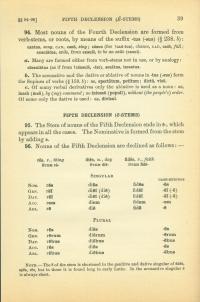94. Most nouns of the 4th Declension are formed from verb-stems, or roots, by means of the suffix -tus (-sus) (§ 238.b).
cantus song; CAN, canō sing
cāsus (for †cad-tus) chance; CAD, cadō fall
exsulātus exile; from exsulō to be an exile (exsul)
a. Many are formed either from verb stems not in use, or by analogy.
cōnsulātus (as if from †cōnsulō, -āre), senātus, incestus
b. The accusative and the dative or ablative of nouns in -tus (-sus)form the Supines of verbs (§ 159.b).
spectātum, petītum; dictū, vīsū
c. Of many verbal derivatives only the ablative is used as a noun;
iussū (meō) by (my) command
iniussū (populī) without (the people's) order
of some only the dative is used.
dīvīsuī
XML Files

